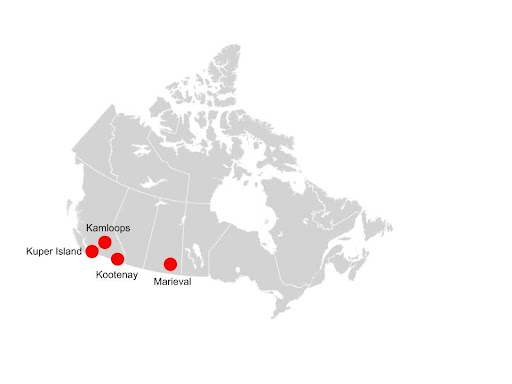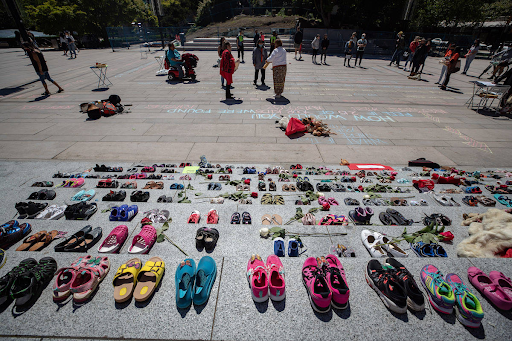Canadian Prime Minister Justin Trudeau visiting the memorial in honour of 215 Indigenous Children remains found at a residential school in British Columbia (BostonGlobe 2021).
By: Julia Li
Another 751.
The news came weeks after the remains of 215 children were found at a similar residential school in British Columbia. The Cowessess First Nation said this discovery was “the most significantly substantial to date in Canada” (BBC News 2021). As we open a hidden door of Indigenous History, Canada’s dark legacy is brought into the light yet again.
There is a shrouded history behind generations of Indigenous peoples. Oral histories and documents collected by The Truth and Reconciliation committee are trying to show the public a new world of neglect, perish, and death.
Yet Canada, still, does not understand the aching pain of the past.
Dead in the soil, are the remnants of hundreds of more deaths— deaths that will never be recorded in history; children dying from ravages of tuberculosis and meningitis, injured from rape and beatings, and their bones that had failed to make it home. That number will never be traced but its greatness will evoke a painful awakening.
Through this period of reflection, we need to re-awaken the languages, culture, and religion, that Canada has once destroyed through systematic genocide.
Concerning this Residential School news, Prime Minister Justin Trudeau shares:
“And together, we must acknowledge this truth, learn from our past, and walk the shared path of reconciliation, so we can build a better future” (MacDonald 2021).
When the Kids Call for Home
During the 19th and 20th centuries, the Canadian government funded more than 130 compulsory boarding schools aiming to assimilate Indigenous youth (BBC News 2021). The National Centre for Truth and Reconciliation has the names of 2800 children who died in residential schools, but many say that at least another 1,600 children remain unnamed (Kloster 2021).
Between 1863 and 1998, more than 150,000 Indigenous children were forcibly taken from their families and relocated to residential schools throughout Canada (BBC News 2021). In the school, the children were not allowed to utter a word of their language and practice their culture. Indeed, as it was infamously said, residential schools were trying, “to kill the Indian within the child” (Government of Canada 2008).
Most Indigenous children had entered the school with average or above-average height and weight but left with below-average. These physical health problems passed through generations, tying back to residential schools.
Few made it back, but returning to their homes as different people. The things they had learned through millennia, where they came from, and who they were, were all taken away. As a result of this trauma so early in childhood, many soon descended into addictions, alcoholism and violence.
There was a history on the land of these schools that had been ignored. Now, decades later, can we turn that ignorance into change?
A Futile Apology
In 2008, twelve years after the last residential school closed, the Canadian Government formally apologized for the system. As Prime Minister Harper offers, “The Government of Canada sincerely apologizes and asks the forgiveness of the Aboriginal peoples of this country for failing them so profoundly.”
They add that the future will promise “a new relationship between Aboriginal peoples and other Canadians” to have a renewed understanding of “strong communities and vibrant cultures and traditions that will contribute to a stronger Canada for all of us” (Government of Canada 2008).
Yet the Roman Catholic church, which was responsible for the operations of up to 70% of residential Schools, did not issue a formal apology (BBC News 2021). Churches that ran residential schools refused to release documents and records that are preventing the country from taking full responsibility, acknowledging its history, and moving forward from it.
Unmarked Graves — Remnants of Hundreds of Children
In May 2021, the Cowessess First Nation began using ground-penetrating radar to locate unmarked graves at the Marieval Indian Residential School Cemetery in Saskatchewan. Now, in July 2021, the gravesites of hundreds of Indigenous people were identified near the former sites of five residential schools in the provinces of British Columbia and Saskatchewan.
The first headline came out on May 28, 2021, reporting the remains of 215 children buried near the site of the Kamloops Residential School (Dickson and Watson 2021). The news shook Canadians, showing the reality of the country’s profound institutional racism and genocide. At the end of the month, Chief Cadmus Delorme announced the discovery of 751 unmarked graves near the former site of the Marieval Residential school (BBC News 2021). In the next month, 182 unmarked graves were discovered near the former St. Eugene’s residential school (Migdal 2021), and 160 unmarked graves were located near the former Kuper Island Industrial school (CTV News 2021).

The locations of the four residential schools discovered with unmarked graves.
(Photo By: Wikimedia Commons 2007, Edited By: Julia Li 2021)
This news has embarked on a journey into recovery, reflection, and acknowledgment. Following these discoveries, Indigenous leaders are searching for more of these gravesites, aided by funding from federal and provincial governments.
Reactions Amid this Season of Distress
The initial discovery of the unmarked graves at Kamloops Residential School inspired many community memorials in Canada. Community monuments were set up at places like the Vancouver Art Gallery where 215 pairs of children's shoes were laid out in rows.

Pairs of childrens’ shoes lined on the steps of the Vancouver Art Gallery (Victoria News 2021)
On June 2, 2021, the federal government pledged C$27 million in funding to the National Centre for Truth and Reconciliation, to locate unmarked graves near former residential schools (White et al. 2021). Provincial governments have also pledged millions of dollars to fund these searches.
Cities in the provinces of British Columbia, Saskatchewan and New Brunswick have cancelled upcoming celebrations for Canada Day, opting instead for a day of reflection. In addition, the Canadian School Boards Association has asked for Indigenous history to be taught from kindergarten to Grade 12 in the Canadian curriculum.
Statues and figures involved with residential schools, including Canada’s first Prime Minister John A. Macdonald, have been vandalized and removed. Many Catholic churches are being destroyed in fires, and the reaction from many Indigenous Chiefs has been negative on this matter. As Chief Keith Crow of the Lower Similkameen Indian Band states, “I'm angry, ... I don't see any positive coming from this and it's going to be tough” (Nolanbarton 2021).
Marion Buller— “Not Good Enough”
Marion Buller served as chief commissioner of the National Inquiry into Missing and Murdered Indigenous Women and Girls. After hearing Justin Trudeau’s condolences, she told CBC News Network, “It's a nice statement. A very well-crafted statement of sympathy and empathy but there's no action there.”
Buller states that the government needs to “prove it with concrete action” and “release the documents” to “take responsibility” and “move forward” (MacDonald 2021).
Jagmeet Singh— “We Need Action”
Federal NDP Leader Jagmeet Singh is pressuring the Canadian government to take a quicker initiative on reconciliation with Indigenous peoples. He is calling on the government to implement every one of the Truth and Reconciliation Commission’s ninety-four recommendations.
Singh says that Trudeau needs to back his words up with action, “We need more than a prime minister who wants to lower the flags at half-mast or to take a knee at a memorial. We need action” (Macsweeney 2021).
"Indigenous people deserve more than words and promises,” Jagmeet Singh comments, “These horrific discoveries make it undeniably clear: the federal government has failed and is continuing to fail First Nations, Inuit and Métis communities” (MacDonald 2021).
A Brighter Future
Ry Moran, an associate librarian in charge of reconciliation at the University of Victoria, explains that the first generation of Indigenous young people who weren’t sent to residential schools represent a hope for the future; “Armed with bitter truths, they will aim to preserve their culture, political rights and languages and rebuild from this generational trauma and genocide.”
“There has to be a place the see the names forever,” he comments, “There has to be a place for ceremony, a place to gather, reflect, remember” (Kloster 2021).
On June 24, 2021, Prime Minister Justin Trudeau expressed his pain and grief on the report of 751 unmarked graves found near a former residential school in Saskatchewan, “The hurt and the trauma that you feel is Canada's responsibility to bear, and the government will continue to provide Indigenous communities across the country with the funding and resources they need to bring these terrible wrongs to light. While we cannot bring back those who were lost, we can – and we will – tell the truth of these injustices, and we will forever honour their memory” (MacDonald 2021).
Works Cited
"Canada: 751 unmarked graves found at residential school.” BBC News, 24 June 2021, https://www.bbc.com/news/world-us-canada-57592243. Accessed 18 July 2021.
The Canadian Press. “Vancouver memorial growing to honour 215 children buried at residential school site.” Victoria News, 29 May 2021, https://www.vicnews.com/news/it-was-devastating-chief-recalls-after-remains-of-215-children-found-in-b-c/. Accessed 18 July 2021.
CTV News Vancouver Staff. “More than 160 unmarked graves found near another B.C. residential school site: Penelakut Tribe.” CTV News, 12 July 2021, https://bc.ctvnews.ca/more-than-160-unmarked-graves-found-near-another-b-c-residential-school-site-penelakut-tribe-1.5506774. Accessed 18 July 2021.
Dickson, Courtney, and Bridgette Watson. “Remains of 215 children found buried at former B.C. residential school, First Nation says.” CBC News, 27 May 2021, https://www.cbc.ca/news/canada/british-columbia/tk-emlups-te-secw%C3%A9pemc-215-children-former-kamloops-indian-residential-school-1.6043778. Accessed 18 July 2021.
Free Media Repository. “File: Canada blank map.svg.” Wikimedia Commons, 3 July 2007, https://commons.wikimedia.org/wiki/File:Canada_blank_map.svg. Accessed 18 July 2021.
Gillies, Rob. “Canadian minister says pope needs to apologize to Indigenous.” The Boston Globe, 2 June 2021, https://www.bostonglobe.com/2021/06/02/world/canadian-minister-says-pope-needs-apologize-indigenous/. Accessed 18 June 2021.
Government of Canada. “Statement of apology to former students of Indian Residential Schools.” 11 June 2008, https://www.rcaanc-cirnac.gc.ca/eng/1100100015644/1571589171655. Accessed 17 July 2021.
Kloster, Darron. “A painful awakening: Uncovering a history of neglect, disease and abuse.” Times Colonist, 6 June 2021, https://www.timescolonist.com/islander/a-painful-awakening-uncovering-a-history-of-neglect-disease-and-abuse-1.24327339. Accessed 13 July 2021.
MacDonald, Brennan. “'Canada's responsibility': Trudeau responds to report of unmarked graves at residential school site.” CBC News, 24 June 2021, https://www.cbc.ca/news/politics/trudeau-responds-marieval-residential-school-discovery-1.6078601. Accessed 13 July 2021.
Migdal, Alex. “182 unmarked graves discovered near residential school in B.C.'s Interior, First Nation says.” CBC News, 30 June 2021, https://www.cbc.ca/news/canada/british-columbia/bc-remains-residential-school-interior-1.6085990. Accessed 18 July 2021.
NOLANBARTON. “Hate crimes against Christians becoming commonplace in Canada.” A Final Warning, 17 7 2021, https://www.afinalwarning.com/536125.html. Accessed 20 7 2021.
White, Patrick, et al. “Ottawa pledges funds to locate unmarked Indigenous graves at residential schools.” The Globe and Mail, 2 June 2021, https://www.theglobeandmail.com/canada/article-ottawa-pledges-27-million-for-uncovering-unmarked-indigenous-graves/. Accessed 18 July 2021.

